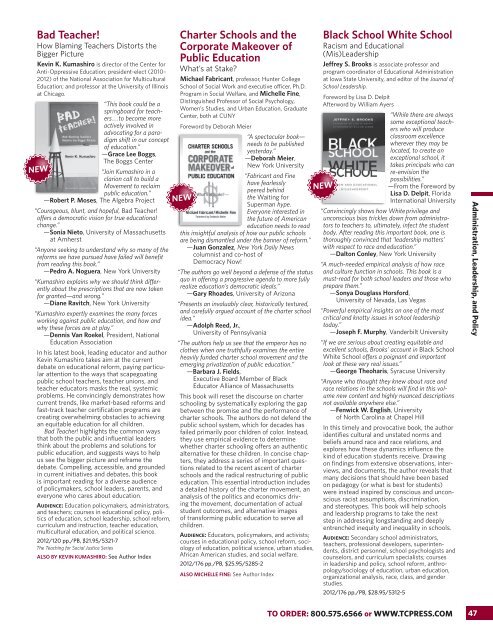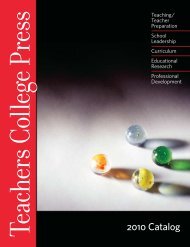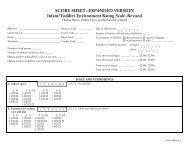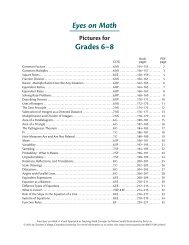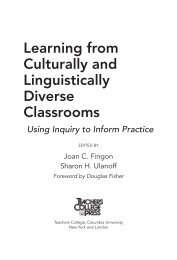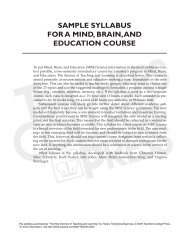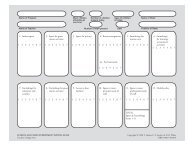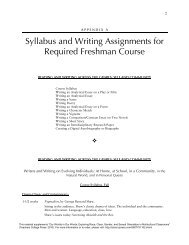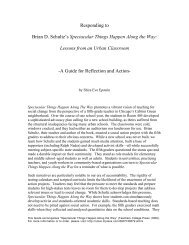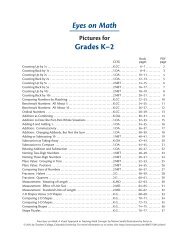estsellers - Teachers College Press
estsellers - Teachers College Press
estsellers - Teachers College Press
Create successful ePaper yourself
Turn your PDF publications into a flip-book with our unique Google optimized e-Paper software.
Bad Teacher!<br />
How Blaming <strong>Teachers</strong> Distorts the<br />
Bigger Picture<br />
Kevin K. Kumashiro is director of the Center for<br />
Anti-Oppressive Education; president-elect (2010–<br />
2012) of the National Association for Multicultural<br />
Education; and professor at the University of Illinois<br />
at Chicago.<br />
New<br />
Edition<br />
NEW<br />
“This book could be a<br />
springboard for teachers...to<br />
become more<br />
actively involved in<br />
advocating for a paradigm<br />
shift in our concept<br />
of education.”<br />
—Grace Lee Boggs,<br />
The Boggs Center<br />
“Join Kumashiro in a<br />
clarion call to build a<br />
Movement to reclaim<br />
public education.”<br />
—Robert P. Moses, The Algebra Project<br />
“Courageous, blunt, and hopeful, Bad Teacher!<br />
offers a democratic vision for true educational<br />
change.”<br />
—Sonia Nieto, University of Massachusetts<br />
at Amherst<br />
Best<br />
Seller<br />
“Anyone seeking to understand why so many of the<br />
reforms we have pursued have failed will benefit<br />
from reading this book.”<br />
—Pedro A. Noguera, New York University<br />
“Kumashiro explains why we should think differently<br />
about the prescriptions that are now taken<br />
for granted—and wrong.”<br />
—Diane Ravitch, New York University<br />
“Kumashiro expertly examines the many forces<br />
working against public education, and how and<br />
why these forces are at play.”<br />
—Dennis Van Roekel, President, National<br />
Education Association<br />
In his latest book, leading educator and author<br />
Kevin Kumashiro takes aim at the current<br />
debate on educational reform, paying particular<br />
attention to the ways that scapegoating<br />
public school teachers, teacher unions, and<br />
teacher educators masks the real, systemic<br />
problems. He convincingly demonstrates how<br />
current trends, like market-based reforms and<br />
fast-track teacher certification programs are<br />
creating overwhelming obstacles to achieving<br />
an equitable education for all children.<br />
Bad Teacher! highlights the common ways<br />
that both the public and influential leaders<br />
think about the problems and solutions for<br />
public education, and suggests ways to help<br />
us see the bigger picture and reframe the<br />
debate. Compelling, accessible, and grounded<br />
in current initiatives and debates, this book<br />
is important reading for a diverse audience<br />
of policymakers, school leaders, parents, and<br />
everyone who cares about education.<br />
Audience: Education policymakers, administrators,<br />
and teachers; courses in educational policy, politics<br />
of education, school leadership, school reform,<br />
curriculum and instruction, teacher education,<br />
multicultural education, and political science.<br />
2012/120 pp./PB, $21.95/5321-7<br />
The Teaching for Social Justice Series<br />
Also by Kevin Kumashiro: See Author Index<br />
Charter Schools and the<br />
Corporate Makeover of<br />
Public Education<br />
What’s at Stake<br />
Michael Fabricant, professor, Hunter <strong>College</strong><br />
School of Social Work and executive officer, Ph.D.<br />
Program in Social Welfare, and Michelle Fine,<br />
Distinguished Professor of Social Psychology,<br />
Women’s Studies, and Urban Education, Graduate<br />
Center, both at CUNY<br />
Foreword by Deborah Meier<br />
New<br />
Edition<br />
“A spectacular book—<br />
needs to be published<br />
yesterday.”<br />
—Deborah Meier,<br />
New York University<br />
“Fabricant and Fine<br />
have fearlessly<br />
peered behind<br />
the Waiting for<br />
Superman hype.<br />
Everyone interested in<br />
the future of American<br />
education needs to read<br />
this insightful analysis of how our public schools<br />
are being dismantled under the banner of reform.”<br />
—Juan Gonzalez, New York Daily News<br />
columnist and co-host of<br />
Democracy Now!<br />
“The authors go well beyond a defense of the status<br />
quo in offering a progressive agenda to more fully<br />
realize education’s democratic ideals.”<br />
—Gary Rhoades, University of Arizona<br />
“Presents an invaluably clear, historically textured,<br />
and carefully argued account of the charter school<br />
idea.”<br />
—Adolph Reed, Jr.,<br />
University of Pennsylvania<br />
“The authors help us see that the emperor has no<br />
clothes when one truthfully examines the entire<br />
heavily funded charter school movement and the<br />
emerging privatization of public education.”<br />
—Barbara J. Fields,<br />
Executive Board Member of Black<br />
Educator Alliance of Massachusetts<br />
This book will reset the discourse on charter<br />
schooling by systematically exploring the gap<br />
between the promise and the performance of<br />
charter schools. The authors do not defend the<br />
public school system, which for decades has<br />
failed primarily poor children of color. Instead,<br />
they use empirical evidence to determine<br />
whether charter schooling offers an authentic<br />
alternative for these children. In concise chapters,<br />
they address a series of important questions<br />
related to the recent ascent of charter<br />
schools and the radical restructuring of public<br />
education. This essential introduction includes<br />
a detailed history of the charter movement, an<br />
analysis of the politics and economics driving<br />
the movement, documentation of actual<br />
student outcomes, and alternative images<br />
of transforming public education to serve all<br />
children.<br />
Audience: Educators, policymakers, and activists;<br />
courses in educational policy, school reform, sociology<br />
of education, political science, urban studies,<br />
African American studies, and social welfare.<br />
2012/176 pp./PB, $25.95/5285-2<br />
NEW<br />
Best<br />
Seller<br />
Also Michelle Fine: See Author Index<br />
Black School White School<br />
Racism and Educational<br />
(Mis)Leadership<br />
Jeffrey S. Brooks is associate professor and<br />
program coordinator of Educational Administration<br />
at Iowa State University, and editor of the Journal of<br />
School Leadership.<br />
Foreword by Lisa D. Delpit<br />
Afterword by William Ayers<br />
New<br />
Edition<br />
NEW<br />
“While there are always<br />
some exceptional teachers<br />
who will produce<br />
classroom excellence<br />
wherever they may be<br />
located, to create an<br />
exceptional school, it<br />
takes principals who can<br />
re-envision the<br />
possibilities.”<br />
—From the Foreword by<br />
Lisa D. Delpit, Florida<br />
International University<br />
“Convincingly shows how White privilege and<br />
unconscious bias trickles down from administrators<br />
to teachers to, ultimately, infect the student<br />
Best<br />
Seller<br />
body. After reading this important book, one is<br />
thoroughly convinced that ‘leadership matters’<br />
with respect to race and education.”<br />
—Dalton Conley, New York University<br />
“A much-needed empirical analysis of how race<br />
and culture function in schools. This book is a<br />
must-read for both school leaders and those who<br />
prepare them.”<br />
—Sonya Douglass Horsford,<br />
University of Nevada, Las Vegas<br />
“Powerful empirical insights on one of the most<br />
critical and knotty issues in school leadership<br />
today.”<br />
—Joseph F. Murphy, Vanderbilt University<br />
“If we are serious about creating equitable and<br />
excellent schools, Brooks’ account in Black School<br />
White School offers a poignant and important<br />
look at these very real issues.”<br />
—George Theoharis, Syracuse University<br />
“Anyone who thought they knew about race and<br />
race relations in the schools will find in this volume<br />
new content and highly nuanced descriptions<br />
not available anywhere else.”<br />
—Fenwick W. English, University<br />
of North Carolina at Chapel Hill<br />
In this timely and provocative book, the author<br />
identifies cultural and unstated norms and<br />
beliefs around race and race relations, and<br />
explores how these dynamics influence the<br />
kind of education students receive. Drawing<br />
on findings from extensive observations, interviews,<br />
and documents, the author reveals that<br />
many decisions that should have been based<br />
on pedagogy (or what is best for students)<br />
were instead inspired by conscious and unconscious<br />
racist assumptions, discrimination,<br />
and stereotypes. This book will help schools<br />
and leadership programs to take the next<br />
step in addressing longstanding and deeply<br />
entrenched inequity and inequality in schools.<br />
Audience: Secondary school administrators,<br />
teachers, professional developers, superintendents,<br />
district personnel, school psychologists and<br />
counselors, and curriculum specialists; courses<br />
in leadership and policy, school reform, anthropology/sociology<br />
of education, urban education,<br />
organizational analysis, race, class, and gender<br />
studies.<br />
2012/176 pp./PB, $28.95/5312-5<br />
to order: 800.575.6566 or www.tcpress.com<br />
47<br />
Administration, Leadership, and Policy<br />
47


